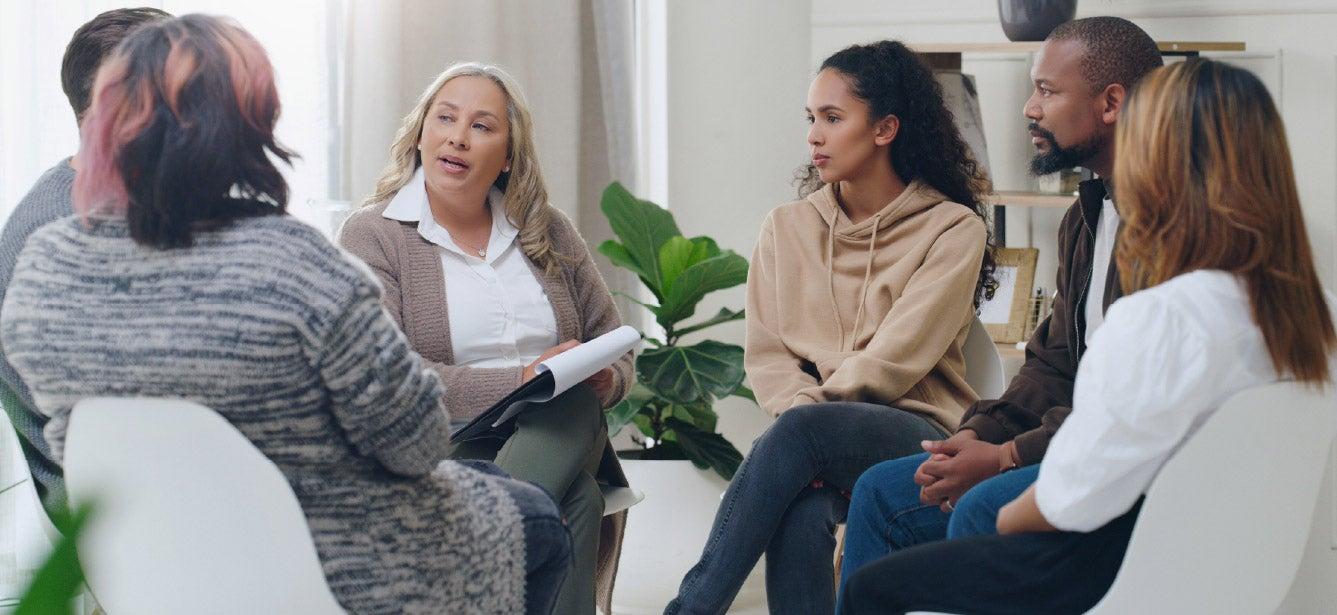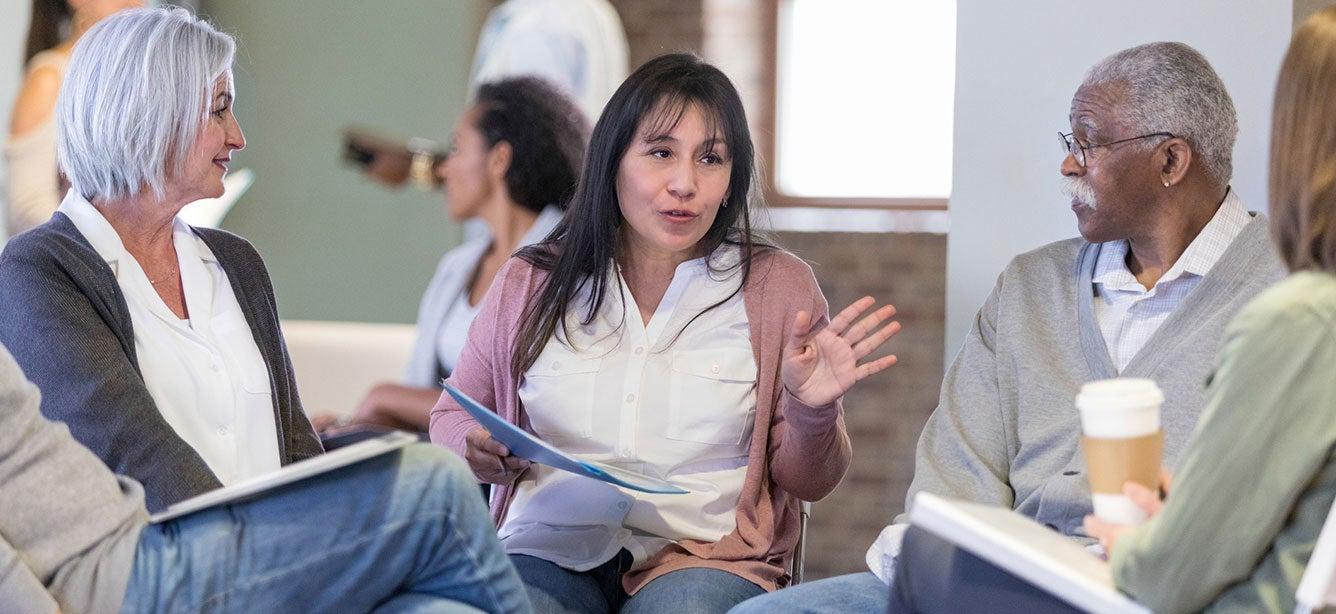Showcasing Community-Based Organization's Innovative Response to COVID-19 with Evidence Based Programs
8 min read

The response to the coronavirus pandemic from the U.S. health care and the aging network’s ecosystems has been remarkable. Each industry has worked quickly to lead innovations for COVID-19 prevention, support, and treatment. As the number of COVID-19 cases continue to surge, the collaborative approach promoted in community-integrated health care practices becomes critically important for the delivery of services and supports for older Americans and individuals with chronic illnesses and disabilities. COVID-19 morbidity and mortality rates are the highest among older Americans, especially those older people and chronically ill consumers with underlying health conditions such as diabetes, hypertension, respiratory conditions, and obesity. Additionally, social determinants of health such as housing, nutritious food, transportation, and support with activities of daily living have a tremendous impact on an older adult’s ability to stay healthy and independent.
The Opportunity & Need for Community-Integrated Health Care
In the wake of the pandemic, health care and community-based organizations (CBOs) have become creative in providing consumer-centric services that offer high value, based on changing needs. Recent national surveys of CBOs have shown an increased demand for home-delivered meals as well as strategies to address social isolation. As health care organizations are identifying new services to meet emerging needs of consumers beyond standard clinical interventions, these circumstances provide new opportunities for CBOs to expand their footprint in the health care ecosystem.
Community-integrated health care, which is the effort to strengthen the connections between traditional medical care and community-based prevention and support services, are necessary to create safety net supports for at-risk populations and help older Americans manage complex medical, behavioral health, and social needs. The community-integrated health care approach is essential to improve care coordination between health care and CBOs. Ideally, sharing of resources across systems leads to comprehensive, multidisciplinary treatment plans that can address the holistic needs of the consumer.
Evidence-based programs, like chronic disease self-management education or falls prevention programs, can play a role in advancing community-integrated health care strategies including:
- Enhanced access to services;
- Improved quality of care;
- Lower overall health care costs; and
- Reduction in the impact of unmet social determinants of health.
Access to evidence-based programs in the community are critical during the pandemic, as people who rely on congregate meal programs and in-person programming are left feeling less connected to their communities due to social distancing. Furthermore, the Center for Disease Control and Prevention (CDC) has reported that 41% of U.S. adults are avoiding medical care due to COVID-19, leaving aging Americans managing complex health conditions without needed support.
Both health care and CBO providers are facing the same conundrum: If the consumer cannot come to the mountain, how do we get the mountain to the consumer? Transitioning in-person programs to virtual platforms has been embraced around the country from the expanded use of telehealth to the exponential increase in the utilization of virtual platforms. We highlight two CBOs who have used innovative strategies to sustain evidence-based programs for their clients in partnership with health care organizations.
Community-Based Innovation to Address Needs During the Pandemic
Networks of community-based organizations can identify opportunities to work more closely with health care organizations, public health departments, foundations, and other stakeholders to increase the efficacy of local coronavirus response efforts. Cutting edge CBOs like Juniper in Minnesota and Western New York Integrated Care Collaborative (WNYICC) provide prime examples of leadership in addressing the needs of older adults and individuals with disabilities in collaboration with local health care partners during the COVID-19 pandemic.
Juniper: Making It Happen in Minnesota
Juniper, a statewide network operating under Innovations for Aging, has partnered with Blue Cross Blue Shield of Minnesota (BCBS MN) to offer evidence-based wellness programs and address social isolation. Evidence-based programs are a covered service for BCBS MN’s dual eligible population. Through the Juniper network, area agencies on aging—six regional and one tribal entity—act as hubs for community organizations, health care providers, and evidence-based program class leaders.
Innovations for Aging is a wholly owned, nonprofit subsidiary of the Metropolitan Area Agency on Aging (MAAA). MAAA serves older adults, people with disabilities, and those who care for them through an integrated system of information, assistance, education, services, and facility-to-home support.
Juniper offers nine unique classes, structured to help people live well, get fit, and prevent falls. During the pandemic, Juniper knew it was imperative to continue to support community members with evidence-based programs. According to Sarah Blonigan, Juniper Network Director, their leadership team invested considerable time assessing need, weighing options, and contemplating infrastructure support before finalizing their alternative programming. She and Sarah Shepherd, Juniper Provider Relationship Manager, commented that their careful deliberation contributed to the successful implementation of practical solutions for their network.
Under normal circumstances, Juniper offers in-person programs in partnership with nearly 140 organizations. About 20 of these organizations have converted programs to a virtual platform. The virtual classes include Tai Ji Quan: Moving for Better Balance, Living Well With Chronic Conditions (also known as Chronic Disease Self-Management Education), and others. Each class offers time before and after the session for socializing among the participants. In one class, two sisters who live at the opposite ends of the state are able to connect for the course’s social hour.
Juniper has also contracted with the BCBS MN to create a virtual program called Social Connect. Social Connect was designed by BCBS MN and one of Juniper’s Provider Relationship Managers, Steve Hoover, Ph.D, to address the need for social connection during the pandemic. Social Connect, a facilitated, small group gathering, meets six times for an hour by video-conferencing or phone. It was designed to provide a remote social gathering space to relieve stress and isolation. While it was developed through a partnership with BCBS MN, the program is open to everyone. It is evidence-informed and uses mindfulness-based stress reduction strategies.
Social Connect gatherings include an opportunity for light exercise and stretching to calm the tension in participants’ bodies, techniques to manage stress and anxiety, and connection with peers. The concluding moments of the Social Connect course is an opportunity for participants to share their self-care strategies in an open and non-judgmental environment. Many participants have continued to stay in touch after the workshop series ends.
Western New York Integrated Care Collaborative: A New York State of Mind
The Western New York Integrated Care Collaborative (WNYICC) is a well-established community-integrated network serving several counties in western New York State. WNYICC is composed of six county-based area agencies on aging, a local United Way, several CBOs operating at the neighborhood (sub-county) level, and a small number of regional CBOs. Many have been a part of the Erie Niagara aging network for decades and provide core Older American Act services including case management, social adult day care, home-delivered meals, personal care services, traditional senior center programs such as congregate meals, and a variety of evidenced-based and evidence-informed programs.
According to Nikki Kmicinski, WNYICC Executive Director, the network holds a number of contracts with several regional health care organizations including Medicaid Managed Long Term Services and Supports and Medicare Advantage plans. New York’s Medicaid transformation program provided incentives for the health plans to connect with CBOs to provide more comprehensive services that address both clinical and social determinants of health needs.
In 2019, New York State’s Medicaid agency added the Diabetes Prevention Program (DPP) as a covered service. WNYICC holds contracts with the health care entities providing DPP, Healthy IDEAS, Diabetes Self-Management Training, and Chronic Disease Self-Management Education. Additionally, WNYICC is a certified Medicare provider and bills CMS directly for DPP. Kmicinski noted that the impact of coronavirus on her region’s health care ecosystem required them to swiftly implement strategies to update their program delivery infrastructure to keep up with rapidly changing community needs. She reported a significant demand to transition their suite of evidence-based programs to virtual platforms. Over the last seven months, WYNICC has successfully converted most of their key programs to a virtual platform to the delight of their contracted health care organizations and participants.
Kmicinski also shared that the network is utilizing the Healthy IDEAS screening tool to identify and address social isolation risk factors and that health care plans are inquiring about opportunities to offer virtual A Matter of Balance and Tai Chi for Arthritis. Unfortunately, per national safety precautions, the A Matter of Balance Program is not currently authorized for virtual settings.
WNYICC leaders are making another bold move to enhance their value to payors. In conjunction with the New York State Office on Aging, they have enhanced the pre- and post-surveys used for evidence-based programs to amplify collection, analysis, and reporting on the efficacy of program outcomes. This step will augment WNYICC’s capacity to discuss return on investment for their services and supports. ROI is viewed from WNYICC’s perspective (sustainability of programs), the funder perspective (i.e. reduction in health care costs), and the participant perspective (i.e. improved health outcomes).
Future Opportunities
As is demonstrated in the preceding examples, community-based organizations are responding to the pandemic’s impact on older Americans with inventive strategies. The value of growing partnerships between CBOs and health care entities will contribute to healthier communities. CBOs should take the lead in expanding relationships with existing health care payors as well as charting relationships with new organizations. Promoting the value of home and community-based services as an essential component of the coronavirus response throughout the health care ecosystem—from hospitals, to health plans, accountable care organizations, provider practices, public health and others—can lay the foundation for broader integrated care engagement for CBOs during this pandemic and beyond
NCOA is a leader in the provision of business acumen technical assistance and training for CBOs. Through the National Falls Prevention and CDSME Resource Centers, we are dedicated to the advancement of CBO sustainability. View more resources on business acumen and sustainability.
References
This project was supported, in part by grant number 90CSSG0048 and 90FPSG0051 from the U.S. Administration for Community Living, Department of Health and Human Services, Washington, D.C. 20201. Grantees undertaking projects under government sponsorship are encouraged to express freely their findings and conclusions. Points of view or opinions do not, therefore, necessarily represent official Administration for Community Living policy.



